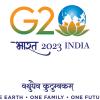
Options Magazine, Winter 2023: The G20 is a global platform for the discussion of cooperation, policy, and governance pathways aligned with the common interests of its member states. This year, India held the Presidency of the G20 under the banner of One Earth, One Family, One Future. To support India’s Presidency, IIASA produced four policy papers providing insight into the complexities of potential multilateral institutional reforms.
Multilateral institutions are the key tool to bring countries together to work toward a common and sustainable future. However, multilateralism is currently in crisis. Multilateral institutions are underfunded and somewhat disempowered to do what they were created for – to facilitate global cooperation on major and shared global problems.
IIASA was invited to produce inputs for the G20 process on the future of multilateralism and key multilateral institutions. The institute convened a consultative process involving 25 renowned external experts from around the world to produce a series of policy papers presenting recommendations that explored several areas of reform, including reforms of the United Nations, climate finance, the World Health Organization (WHO), and the World Trade Organization (WTO).
The policy papers were prepared through joint efforts of IIASA researchers under the leadership of IIASA Director General Albert van Jaarsveld, IIASA Advancing Systems Analysis Program Director, Elena Rovenskaya, and IIASA Distinguished Visiting Fellow and President of the UN Sustainable Development Solutions Network, Jeffrey Sachs.
“IIASA conducts policy-oriented research into pressing concerns that affect the future of all of humanity, such as climate change, energy security, population aging, and sustainable development. By deploying systems thinking, IIASA can coordinate knowledge sharing, synthesis, and the co-development of policy recommendations, such as these policy papers,” notes Rovenskaya.
Many of the recommendations made in these policy papers found traction and resonance in the G20 New Delhi Leaders’ Declaration. Among those key recommendations were: strengthening the role and reach of the global multilateral system while increasing the representativeness, transparency, equity, and accountability of its major institutions; strengthening the voice of developing countries in global decision making; renewing the commitment to open, inclusive, equitable, fair, transparent, and sustainability-promoting global trade with the WTO at its core; scaling up a diversity of affordable financial sources to support the achievement of the global developmental and Agenda 2030 objectives; and enhancing the capacity of the Multilateral Development Banks to contribute to this goal.
These key principles are expected to be carried forward into the upcoming G20 sessions in 2024 and 2025, helping to foster global solidarity for a sustainable future.
By Vladimir Tarakanov
Publications
van Jaarsveld, A., Rovenskaya, E. , & Sachs, J. (2023). Making Transformation Happen: Climate Finance. Policy paper for G20. IIASA Report. Laxenburg: IIASA
van Jaarsveld, A., Rovenskaya, E. , & Sachs, J. (2023). Strengthening the UN to Confront Collective Challenges. Policy paper for G20. IIASA Report. Laxenburg: IIASA
van Jaarsveld, A., Rovenskaya, E. , & Sachs, J. (2023). Effective Health Care and Global Pandemic Preparedness. Policy paper for G20. IIASA Report. Laxenburg: IIASA
van Jaarsveld, A., Rovenskaya, E. , & Sachs, J. (2023). Strengthening WTO and the Global Trade System for Sustainable Development. Policy paper for G20. IIASA Report. Laxenburg: IIASA
